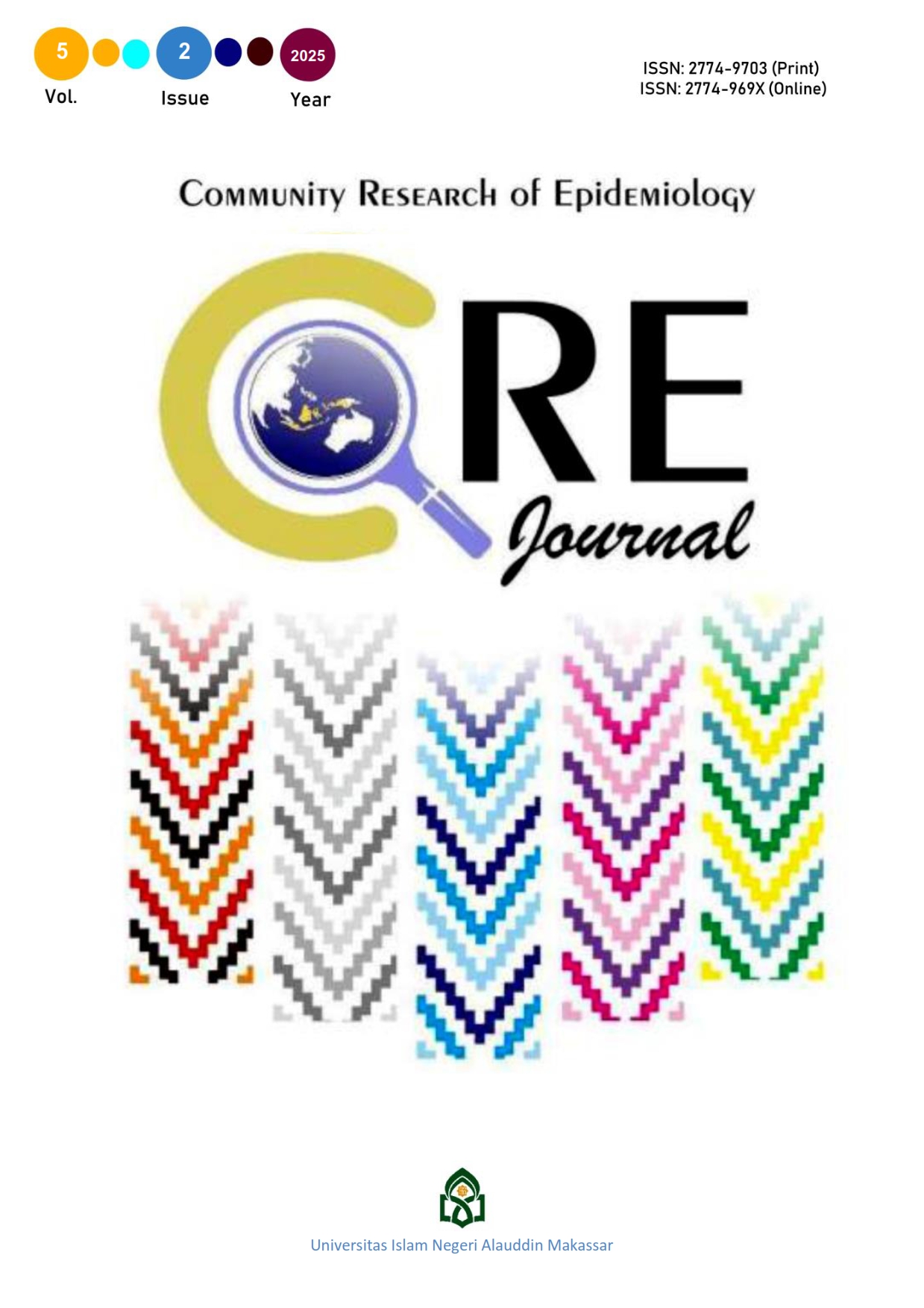Integrating self-awareness surveys and ovitrap monitoring to enhance dengue vector control
A community-based experimental study in Bulusan Village, Semarang City
DOI:
https://doi.org/10.24252/corejournal.v5i2.57867Keywords:
community participation, mosquito control, ovitrap, self-awareness, severe dengueAbstract
Previous studies on Dengue Hemorrhagic Fever (DHF) prevention have often emphasized knowledge dissemination and community participation without directly linking these behavioral interventions to measurable entomological outcomes. There remains a gap in evidence regarding the integration of self-awareness strategies with vector surveillance indicators such as the Container Index (CI) and the Free Larvae Index (ABJ). This study aimed to evaluate the effectiveness of a community-based self-awareness survey combined with ovitrap training in controlling mosquito breeding as a preventive measure against DHF in Bulusan Village, Semarang City. This descriptive observational experimental study involved households selected through incidental sampling during routine Mosquito Nest Eradication (PSN) activities. Participants received training on installing simple ovitraps made from various household materials, which were monitored over one to two weeks. Entomological outcomes were assessed using CI and ABJ, supported by environmental observations and household interviews. The results revealed that all ovitrap types successfully detected mosquito larvae, with mineral water containers showing the highest Container Index (12.5%). This intervention led to an increase in ABJ, indicating improved mosquito control practices. The integration of behavioral self-awareness tools with low-cost entomological surveillance offers a promising model for community empowerment in DHF prevention. These findings suggest that collaborative efforts between communities and local health stakeholders can strengthen sustainable and environmentally friendly vector control strategies, particularly in endemic urban settings.
References
Alarcón Elbal, P. M., López de Felipe, M., Gil Torró, I., García Masiá, I., Mateo Herrero, P., & Bueno Marí, R. (2024). Knowledge, attitude, and practices of adults and children towards the Asian tiger mosquito, Aedes albopictus (Diptera: Culicidae), in a recently invaded municipality of Valencia, Spain. International Journal of Tropical Insect Science, 44(4), 1633–1648. https://doi.org/10.1007/s42690-024-01224-6
Ardianto, M., & Etlidawati, E. (2022). The correlation between self-awareness and psychological well being on caring behavior. Proceedings Series on Health & Medical Sciences, 3, 46–50. https://doi.org/10.30595/pshms.v3i.618
Askrening, A., Supryatno, A., Yunus, R., & Supiati, S. (2021). Factors related to the presence of mosquito eggs trapped in ovitraps: DHF endemic areas in Kendari City, Indonesia. Public Health of Indonesia, 7(4), 159–165. https://doi.org/10.36685/phi.v7i4.445
Baiz, M., Rauf, H., Ahmed, A., & Fatima, A. (2024). Clinical course and outcome of patients with dengue fever, dengue hemorrhagic fever and dengue shock syndrome in a tertiary care hospital in recent endemic 2022. Pakistan Postgraduate Medical Journal, 35(01), 16–21. https://doi.org/10.51642/ppmj.v35i01.651
Baldwin, R., Pereira, R., Koehler, P., & Xue, R. D. (2025). A review of lethal ovitraps for management of urban Aedes mosquito vectors. Journal of the Florida Mosquito Control Association, 72(1). https://doi.org/10.32473/jfmca.72.1.139352
Bastos, A., Leite, P., Mallet, J., Mello, C., Serdeiro, M., Silva, J., & Alencar, J. (2021). Spawning behavior of Aedini (Diptera: Culicidae) in a remnant of Atlantic Forest in the state of Rio de Janeiro. Parasites & Vectors, 14(1). https://doi.org/10.1186/s13071-021-05102-9
Bur, R., Suwarto, S., Pohan, H., Prihartono, J., Harahap, A., Dewi, B., & Yusuf, H. (2024). Early intervention of 5% albumin shown superior control of vascular integrity and function compared to Ringer’s lactate in hospitalized adults with grade I & II dengue hemorrhagic fever: A multicenter randomized controlled trial in Indonesia [Preprint]. https://doi.org/10.21203/rs.3.rs-4324185/v1
Caperon, L., Saville, F., & Ahern, S. (2022). Developing a socio ecological model for community engagement in a health programme in an underserved urban area. PLOS ONE, 17(9), e0275092. https://doi.org/10.1371/journal.pone.0275092
Chang, K., Max, S., & Celse, J. (2021). Employee lying behavior and the role of self awareness. International Journal of Organizational Analysis, 30(6), 1538–1553. https://doi.org/10.1108/IJOA-12-2020-2513
Conners, K., Hashemian, M., Kinzy, C., Hall, J., Herr, C., Sharma, R., & Roger, V. (2024). Awareness of heart failure, blood pressure management and self efficacy: The Research Goes Red for Women registry. Women’s Health, 20. https://doi.org/10.1177/17455057241306807
Dias, R., Mello, C., Santos, G., Carbajal de la Fuente, A., & Alencar, J. (2023). Vertical distribution of oviposition and temporal segregation of arbovirus vector mosquitoes (Diptera: Culicidae) in a fragment of the Atlantic Forest, Rio de Janeiro, Brazil. Tropical Medicine and Infectious Disease, 8(5), 256. https://doi.org/10.3390/tropicalmed8050256
Farahita, G., Hendrati, L., & Ssekalembe, G. (2023). Dengue hemorrhagic fever inclination tendency in East Java villages: Community-based total sanitation. Jurnal Berkala Epidemiologi, 11(2), 110–119. https://doi.org/10.20473/jbe.v11i22023.110-119
Farich, A., Lipoeto, N., Bachtiar, H., & Hardisman, H. (2020). The effects of community empowerment on preventing dengue fever in Lampung Province, Indonesia. Open Access Macedonian Journal of Medical Sciences, 8(E), 194–197. https://doi.org/10.3889/OAMJMS.2020.4192
Fuadzy, H., Widawati, M., Astuti, E., Prasetyowati, H., Hendri, J., Nurindra, R., & Hodijah, D. (2020). Risk factors associated with dengue incidence in Bandung, Indonesia: A household based case control study. Health Science Journal of Indonesia, 11(1), 45–51. https://doi.org/10.22435/hsji.v11i1.3150
Garjito, T., Hidajat, M., Kinansi, R., Setyaningsih, R., Anggraeni, Y., Mujiyanto, M., & Frutos, R. (2020). Stegomyia indices and risk of dengue transmission: A lack of correlation. Frontiers in Public Health, 8. https://doi.org/10.3389/fpubh.2020.00328
Downloads
Published
How to Cite
Issue
Section
License
Copyright (c) 2025 Roro Kushartanti, Nur Gilang Fitriana

This work is licensed under a Creative Commons Attribution-NonCommercial-ShareAlike 4.0 International License.


